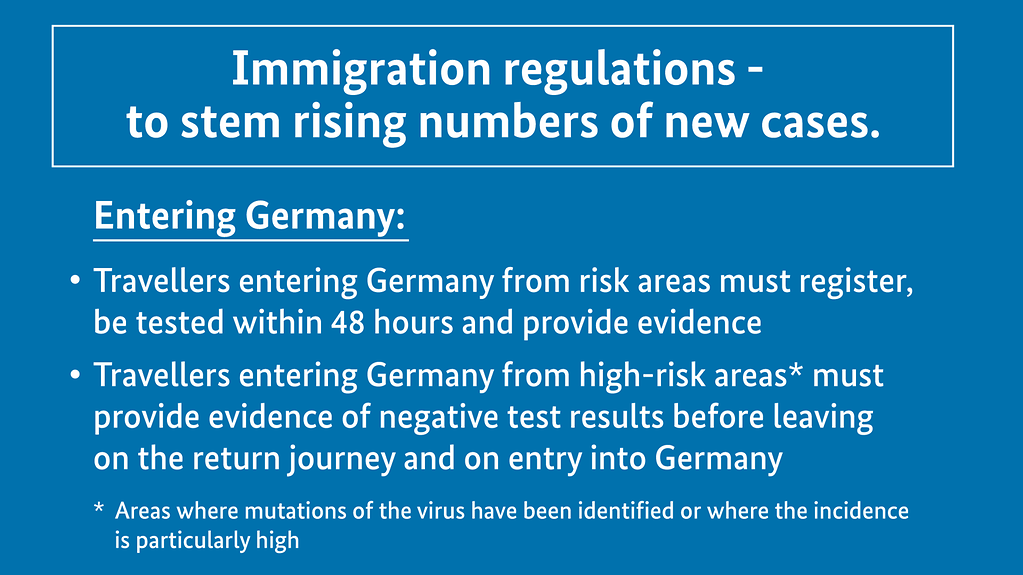COVID-19 regulations for travellers entering Germany
Everyone entering the Federal Republic of Germany from an area designated a risk area is required to provide evidence that they are not infected with the coronavirus within 48 hours of entering Germany. Travellers from particularly affected regions, with high incidences of COVID-19 or where variants of the virus have been identified, will have to provide evidence that they have tested negative before they enter the country. These provisions are laid out in the immigration regulations of the Federal Ministry of Health.
3 min reading time

Everyone who has been in an area designated as a risk area will have to register, be tested and provide evidence in order to enter the Federal Republic of Germany.
Against a blue background the diagram is headed: New immigration regulations – to stem rising numbers of new cases. Below this is the caption: Entering Germany and the following points:
- Travellers entering Germany from risk areas must register, be tested within 48 hours and provide evidence
- Travellers entering Germany from high-risk areas* must provide evidence of negative test results before leaving on the return journey and on entry into Germany
* Areas where mutations of the virus have been identified or where the incidence is particularly high
Photo: Bundesregierung
The immigration regulations aim to minimise the number of cases of COVID-19 imported from high or very high risk areas outside Germany. Everyone who has been in an area designated as a risk area will have to register, be tested and provide evidence of the test results in order to enter the Federal Republic of Germany. The regulations came into effect on 14 January.
A distinction is made between three types of risk areas outside Germany:
- Areas where the Federal Ministry of Heath, in conjunction with the Federal Foreign Office and the Federal Ministry of the Interior, has identified a higher risk of infection with a threatening communicable disease
- High-incidence areas, where the incidence is several times higher than that in Germany, but at least 200
- Areas in which particularly infectious variants of the virus are widespread.
All travellers who have been in a risk area will have to fill in an online immigration registration form before they enter Germany, as is already the case. Within 48 hours of entering the country they must have evidence that they were not infected with SARS-CoV-2 at the time they entered the country, and must present this to the relevant authority on request.
Everyone entering Germany from a risk area in which there is a particularly high incidence or where particularly infectious variants of the virus are widespread will have to carry this evidence on their person when they enter the country and present it, on request, to the carrier before they leave, to the relevant authorities on entry into Germany or to officers undertaking any police checks.
The Robert Koch Institute provides an overview of designated risk areas, high incidence areas and areas where variants of the virus have been identified.
Preventing the spread of virus variants as far as possible
"Travel to foreign risk areas is not appropriate in this pandemic situation. Anyone who nevertheless insists on travelling will have to be tested on their return in future. Mutations of the virus are an additional threat to our health. We must prevent them spreading in Germany as far as possible," stressed Federal Health Minister Jens Spahn.
Mandatory quarantine still applies
The common goal of the federal and state governments is to prevent travellers entering Germany becoming new sources of infection in the country. The requirement to self-isolate, i.e. to quarantine, on arrival from risk areas remains in place. Travellers arriving from outside Germany, who have been in an area designated a risk area by the Federal Ministry of Health, the Federal Foreign Office and the Federal Ministry of the Interior within the last ten days, are required to quarantine immediately on their arrival in Germany for a period of ten days.
Under certain circumstances exceptions to mandatory quarantine can apply. The individual federal states impose mandatory quarantine regulations for all travellers arriving from abroad and also stipulate any exceptions to this rule. Please check the regulations that apply in your federal state.
Another change is that as of 1 March, mobile telephony providers must inform their customers by text message about the immigration and infection control measures in place in Germany.